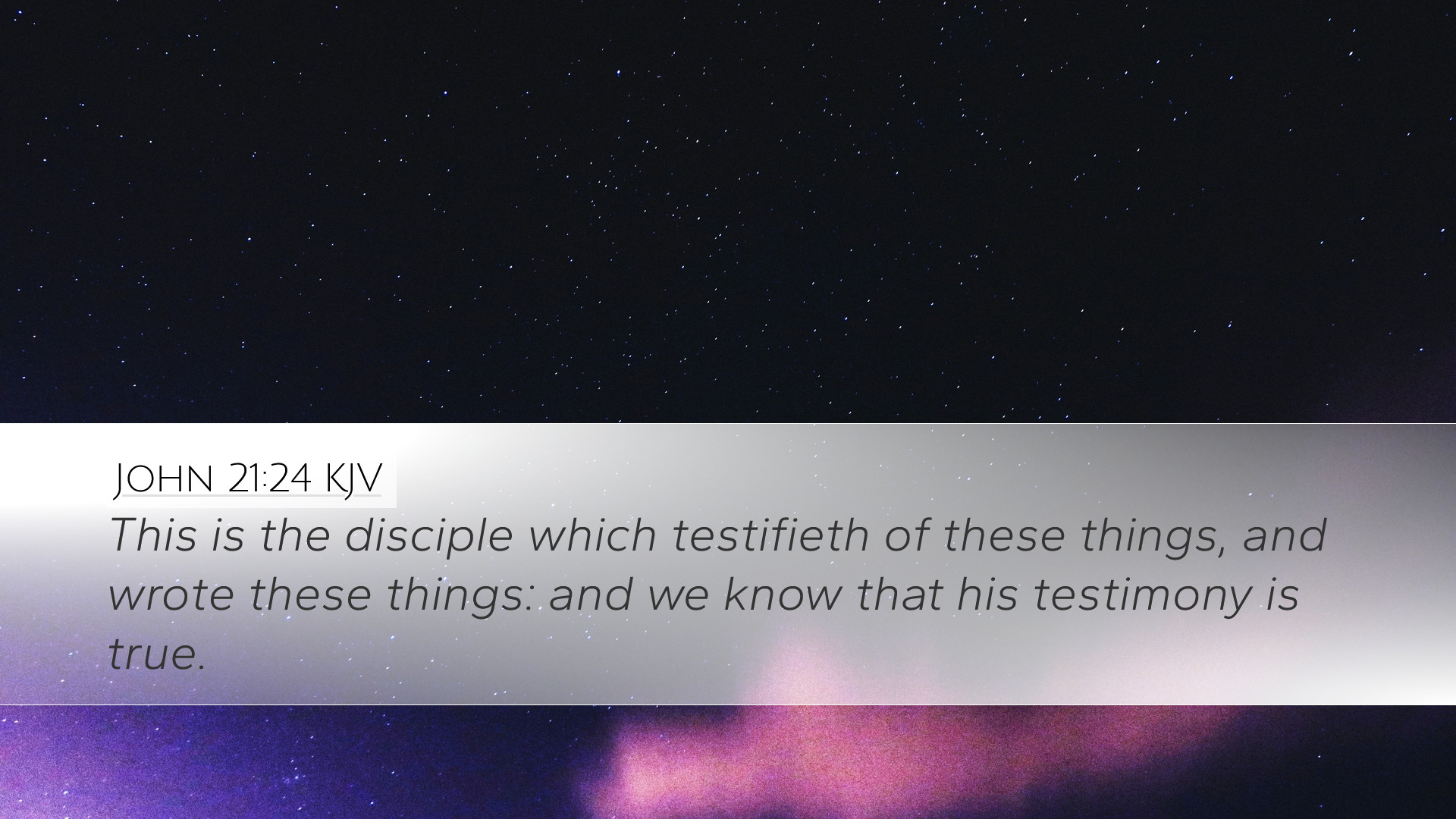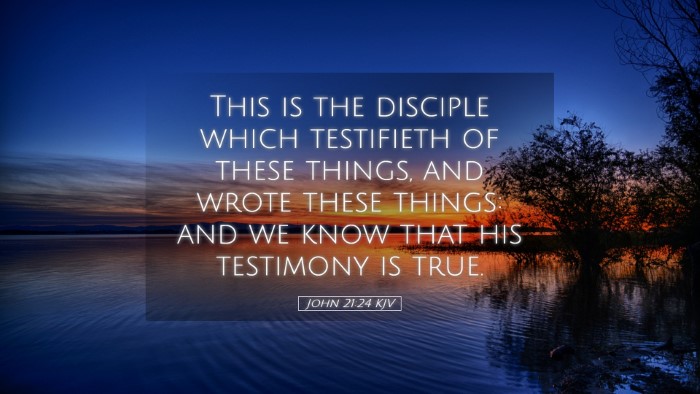Old Testament
Genesis Exodus Leviticus Numbers Deuteronomy Joshua Judges Ruth 1 Samuel 2 Samuel 1 Kings 2 Kings 1 Chronicles 2 Chronicles Ezra Nehemiah Esther Job Psalms Proverbs Ecclesiastes Song of Solomon Isaiah Jeremiah Lamentations Ezekiel Daniel Hosea Joel Amos Obadiah Jonah Micah Nahum Habakkuk Zephaniah Haggai Zechariah MalachiJohn 21:24
John 21:24 KJV
This is the disciple which testifieth of these things, and wrote these things: and we know that his testimony is true.
John 21:24 Bible Commentary
John 21:24 - Summary and Commentary
John 21:24 states, "This is the disciple who testifies of these things, and wrote these things; and we know that his testimony is true." This verse serves as a concluding remark that connects the Gospel of John to its authoritative witness and the truthfulness of its message. In this commentary, we will explore the insights drawn from public domain commentaries, including those by Matthew Henry, Albert Barnes, and Adam Clarke, providing a comprehensive understanding for pastors, students, theologians, and scholars.
Contextual Analysis
This verse appears at the end of the Gospel of John, concluding the narrative that centers around the life, death, and resurrection of Jesus Christ. The author identifies himself as “the disciple” rather than naming himself directly, which highlights humility and a focus on the message rather than the messenger.
The Identity of the Disciple
The phrase "this is the disciple" refers to John the Apostle, who is traditionally believed to be the author of this Gospel. As Matthew Henry points out, John's anonymity promotes a belief that the message of Christ is more significant than the individual proclaiming it.
Testimony and Authenticity
The term “testifies” is crucial. Albert Barnes elaborates on the importance of testimony in the biblical context. The Gospel accounts were often based on personal witness, emphasizing reliability. The assertion that “we know that his testimony is true” affirms the assurance that the teachings of Jesus recorded in John’s Gospel are credible.
Theological Implications
This verse underlies significant theological principles regarding truth and witness in Christianity. Below are some key implications derived from the commentaries.
-
The Importance of Testimony:
John declares himself a witness of Christ’s life and teachings. Adam Clarke notes that authentic Christian witness relies on personal experience and observation of God's truths.
-
The Nature of Written Revelation:
The act of writing these things indicates the transition from oral traditions to written scripture, which played a crucial role in the preservation of Christ's teachings. This transition is essential for the church’s future generations to access the truth of the Gospel.
-
Assurance of Truth:
Assertion of truth is vital for faith. John affirms that the testimony he provides is not merely subjective but is grounded in divine revelation, as noted by Barnes. This lends authority to the Gospel and ensures it carries weight in matters of faith.
Historical Context
Understanding the historical context of John’s Gospel adds richness to this verse. It was written during a time when the early church faced opposition, and establishing the truth of the Gospel was paramount. Henry reiterates that such affirmations were essential for the believers facing skepticism.
Addressing Heresies
In the first century, as Adam Clarke points out, various heresies were arising that challenged the nature of Christ and the truth of the Gospel. The apostle John's testimony serves as a counter to these false teachings, reinforcing the authenticity of the Christological claims made in the preceding chapters.
Application for Modern Readers
John 21:24 holds significant application for modern believers and church leaders.
-
Encouragement in Witness:
Believers are called to share their testimonies with the same authenticity as John. The assurance that their witness aligns with biblical truth is crucial to the propagation of the Gospel.
-
Scriptural Integrity:
Understanding the reliability of scripture encourages deeper study and engagement with God’s Word. Scholars and theologians can appreciate the historical transactional nature of scriptural accounts.
-
Spiritual Authority:
The authority of the Gospel remains intact, and its claims about Jesus can be defended using the compelling witness of scripture. Pastors may utilize this verse to strengthen their congregations' faith in Jesus as the true Son of God.
Conclusion
John 21:24 encapsulates the essence of discipleship, witness, and the integrity of scriptural truth. By exploring the insights of public domain commentaries, we gain a fuller understanding of John's intent and the lasting significance of his testimony. As modern-day readers, we are reminded of our responsibilities to bear witness to the truth of Christ, fortifying our faith based on the solid foundation presented in the Scriptures.


